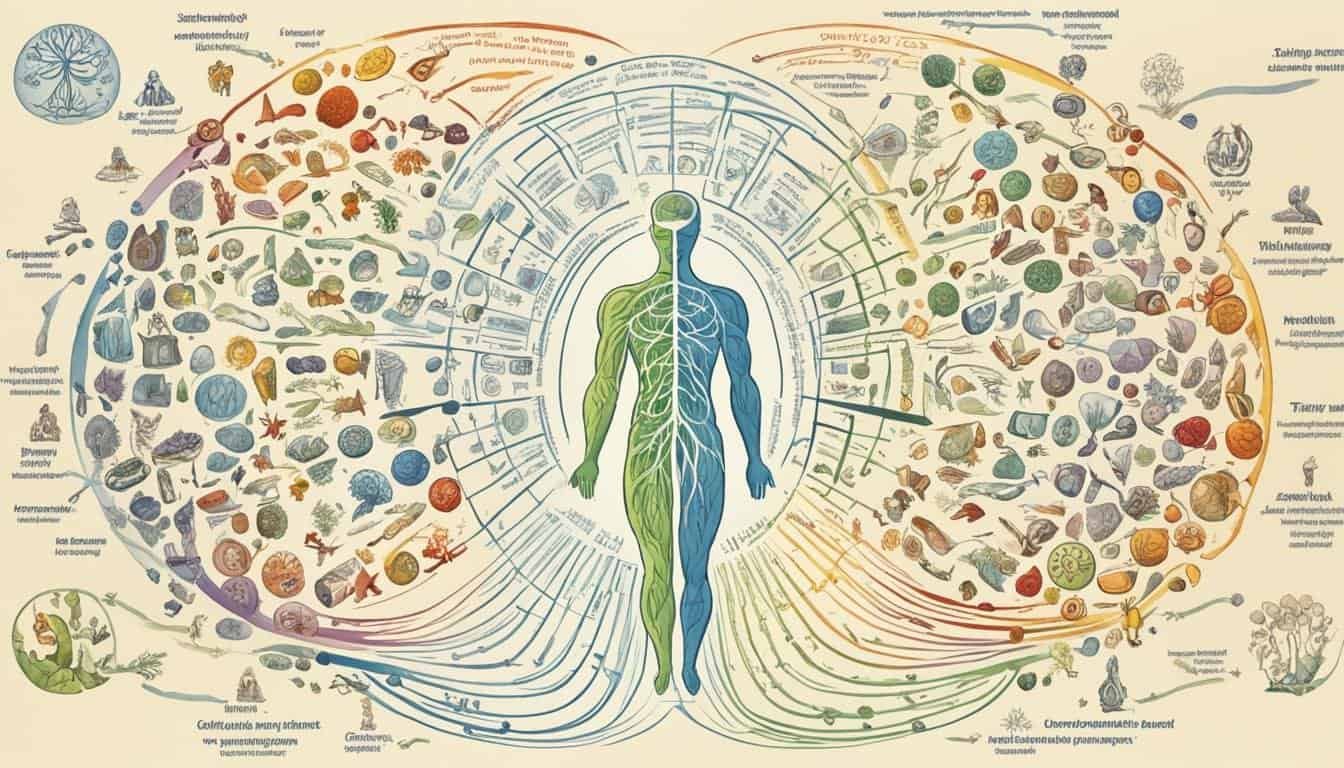Exploring Transpersonal Anthropology Insights
“The study of consciousness is the primary and most fundamental task of transpersonal anthropology, for it is consciousness and consciousness alone that connects the human psyche to the spiritual dimensions of existence.” – Stanislav Grof
Transpersonal anthropology delves into the depths of human experiences, exploring the intricate connections between anthropology, psychology, and spirituality. Through the lens of transpersonal anthropology, we gain insights into the fascinating realms of consciousness, spirituality, and cross-cultural human experiences.
Key Takeaways:
- Transpersonal anthropology explores the intersections of anthropology, psychology, and spirituality.
- It delves into the study of consciousness, spirituality, and cross-cultural human experiences.
- Transpersonal anthropology takes a holistic approach, considering the interconnectedness of mind, body, and spirit.
- Shamanism plays a significant role in transpersonal anthropology, offering insights into altered states of consciousness.
- Integrative approaches in transpersonal anthropology focus on healing, personal growth, and transformation.
Understanding Transpersonal Anthropology
Transpersonal anthropology adopts a holistic approach, recognizing the interconnectedness of mind, body, and spirit in comprehending the intricacies of human experiences. By embracing a broader perspective, it incorporates cross-cultural perspectives to explore the diverse manifestations of spirituality and consciousness across various societies. Additionally, the field draws from psychological anthropology, delving into the psychological processes intertwined with transcendent experiences.
The Holistic Approach
The holistic approach of transpersonal anthropology emphasizes the integration of various dimensions of human existence, aiming to comprehend the complexity of human experiences. It recognizes that physical, psychological, and spiritual aspects are intrinsically linked, influencing one another and shaping individuals’ understanding of themselves and the world around them.
“The interconnectedness of mind, body, and spirit lies at the heart of transpersonal anthropology, providing a comprehensive framework for exploring the depths of human consciousness and spirituality.”
Cross-Cultural Perspectives
Transpersonal anthropology acknowledges the importance of considering diverse cultural contexts to truly grasp the richness and breadth of spirituality and consciousness. By examining the expressions of these phenomena across different societies, transpersonal anthropologists gain valuable insights into how culture shapes individuals’ beliefs, practices, and experiences related to the transpersonal realm.
By engaging with cross-cultural perspectives, transpersonal anthropology fosters cross-cultural understanding and highlights the universality of spiritual experiences while respecting and celebrating their unique cultural expressions.
Psychological Anthropology
Psychological anthropology explores the psychological processes occurring within individuals and communities, shedding light on the intricacies of human behavior and experiences. In the context of transpersonal anthropology, it affirms the significance of psychological processes in transcendent experiences, providing a deeper understanding of how these experiences manifest, transform, and influence individuals’ perceptions of self and the world.
This interdisciplinary approach merges insights from psychology, anthropology, and spirituality, enabling transpersonal anthropologists to explore the connection between the mind, culture, and the transcendent aspects of human existence.
“By examining the psychological dimensions of transcendent experiences, transpersonal anthropology strives to unravel the mysteries of human consciousness and spirituality, bridging the gap between science and spirituality.”
A Comparative Analysis of Holistic Approaches in Anthropology
| Approach | Description |
|---|---|
| Holistic Anthropology | Considers the interconnectedness of all aspects of human existence, emphasizing the need to understand the whole rather than just individual parts. Recognizes the importance of context and cultural influences on human experiences. |
| Psychological Anthropology | Investigates the psychological processes embedded within human behavior and experiences. Explores how cultural factors shape individual and collective psyches. |
| Transpersonal Anthropology | Integrates the holistic and psychological approaches, examining conscious and unconscious experiences, spirituality, and the transcendent aspects of human existence within diverse cultural contexts. |
The Role of Shamanism in Transpersonal Anthropology
Shamanism holds a crucial place in transpersonal anthropology, providing invaluable insights into altered states of consciousness and spiritual practices. By exploring shamanic traditions, transpersonal anthropologists gain a deeper understanding of the transformational experiences that humans undergo and their interconnectedness with nature and the spirit world.
Shamanism is the ancient practice of connecting with the spiritual realm through rituals, ceremonies, and direct communication with spirits. It encompasses various indigenous belief systems and practices found across cultures worldwide. Shamans, as spiritual healers and intermediaries, play a significant role in facilitating healing, guiding individuals through transformative journeys, and maintaining the balance between humans and the supernatural.
The study of shamanism in anthropology sheds light on the human potential for spiritual growth, healing, and transcendence. It offers a unique perspective on how individuals can tap into their inner power and align themselves with the natural and spiritual forces that surround them. Through shamanic practices, individuals can experience altered states of consciousness, access hidden knowledge, and gain insights that can catalyze personal transformation.
Transpersonal anthropology recognizes the profound impact of shamanism on individuals and communities, as well as its relevance in understanding the human quest for spiritual meaning and fulfillment. By studying shamanic traditions and their associated rituals, transpersonal anthropologists contribute to the broader understanding of transformative experiences and the diverse ways in which cultures navigate the spiritual dimensions.
In conclusion, shamanism plays an integral role in transpersonal anthropology, offering unique insights into altered states of consciousness, spiritual practices, and the intricate relationship between humans, nature, and the spiritual realm. By delving into the world of shamanism, transpersonal anthropologists deepen their understanding of the human potential for healing, spiritual growth, and transcendence.
The Transformative Power of Shamanic Rituals
Shamanic rituals serve as powerful catalysts for personal transformation and spiritual growth. Through trance-like states induced through rhythmic drumming, chanting, dancing, and the use of sacred plants, individuals can access deeper layers of consciousness and connect with spiritual realms. These rituals often involve encounters with spirits, animal guides, and ancestors, leading to profound healing, self-discovery, and a sense of interconnectedness with the larger web of life.
“Shamanic rituals provide a gateway to the sacred realms, facilitating experiences that transcend ordinary reality and open doors to personal growth and spiritual insights.” – Dr. Maria Rodriguez, Transpersonal Anthropologist
Integrative Approaches in Transpersonal Anthropology
Transpersonal anthropology recognizes the intricate connection between the mind and body, and its role in facilitating holistic healing and well-being. By integrating various modalities and practices, such as transpersonal therapy, meditation, breathwork, and other spiritual techniques, transpersonal anthropology aims to foster personal growth and transformation.
The mind-body connection is a fundamental aspect of transpersonal anthropology, acknowledging that our thoughts, emotions, and spiritual experiences profoundly impact our physical well-being. This approach emphasizes the need for individuals to embark on an inner journey and integrate their spiritual experiences into their daily lives.
“The mind and body are not separate entities; they are intrinsically interconnected and influence one another.” – Dr. Samantha Thompson, Transpersonal Anthropologist
The Role of Transpersonal Therapy
Transpersonal therapy is an essential component of integrative approaches in transpersonal anthropology. This therapeutic modality focuses on addressing the spiritual dimensions of human experiences and helps individuals navigate their inner landscapes.
Through transpersonal therapy, individuals explore the depths of their consciousness, uncovering hidden beliefs, traumas, and insights that contribute to their holistic healing process. This approach encourages self-reflection, mindfulness, and self-acceptance, enabling individuals to tap into their innate wisdom and potential for growth.
Exploring Meditation and Breathwork
Meditation and breathwork play significant roles in transpersonal anthropology, cultivating a deeper connection with one’s consciousness and spiritual essence. These practices enhance mindfulness, promote relaxation, and facilitate inner exploration.
Through meditation, individuals can quiet the mind, gain clarity, and access higher states of consciousness. Breathwork techniques, such as conscious breathing exercises, help individuals release emotional blockages and connect with their bodies on a profound level.
The Integration of Spiritual Practices
Integrative approaches in transpersonal anthropology emphasize the integration of spiritual practices into one’s daily life. This integration allows individuals to embody their spiritual experiences and incorporate the wisdom gained from these practices into their actions and relationships.
Whether it’s through meditation, mindfulness, prayer, or engaging in sacred rituals, the integration of spiritual practices fosters a deeper sense of purpose, connection, and well-being. It enables individuals to align their thoughts, emotions, and actions with their spiritual values, leading to a more harmonious and fulfilling life.
Transpersonal anthropology offers a holistic framework that recognizes the interconnectedness of the mind, body, and spirit in the healing and growth process. By exploring integrative approaches, individuals can cultivate a deeper understanding of themselves, their spirituality, and the transformative potential within.
Historical and Cultural Perspectives in Transpersonal Anthropology
In the field of transpersonal anthropology, historical and cultural perspectives are essential for understanding the significance of spiritual practices and beliefs in different societies. By exploring ancient spiritual practices that have been passed down through generations, we can gain insights into the diverse cultural experiences of spirituality. This examination allows us to appreciate the rich tapestry of human spirituality, characterized by cultural diversity and unique expressions of ancient spiritual practices.
Indigenous knowledge and wisdom form a crucial component of transpersonal anthropology. Indigenous cultures hold ancient traditions rooted in spiritual practices that have shaped their communities for centuries. These indigenous perspectives offer valuable insights into transpersonal phenomena and highlight the human quest for meaning and purpose. By honoring and studying indigenous knowledge, transpersonal anthropology can contribute to a more comprehensive understanding of spiritual experiences and their transformative potential.
“Cultural diversity and the preservation of ancient spiritual practices are vital for comprehending the full spectrum of transpersonal experiences across different societies.”
Additionally, historical and cultural perspectives help us contextualize transpersonal experiences within specific social, political, and religious contexts. By examining how different belief systems and historical events have influenced spiritual practices, we can better understand the interplay between culture and spirituality. This exploration allows us to appreciate the dynamic nature of transpersonal experiences and their evolution over time.
Cultural Diversity in Transpersonal Experiences
Cultural diversity is a central theme in transpersonal anthropology. It underscores the importance of recognizing and respecting the unique spiritual practices and beliefs found in different cultures. Through the study of cultural diversity, we can gain a broader perspective on the human experience and the variety of ways individuals seek spiritual connection and transcendence.
Ancient Spiritual Practices Passed Down Through Generations
Ancient spiritual practices hold immense wisdom and significance. Passed down through generations, these practices offer profound insights into the human quest for spiritual growth and transformation. By delving into these ancient practices, transpersonal anthropology uncovers timeless wisdom that continues to resonate with individuals seeking meaning and connection.
“The examination of ancient spiritual practices sheds light on the universal aspects of the human experience and our shared spiritual heritage.”
Transpersonal anthropology encourages us to appreciate the depth and breadth of cultural wisdom, recognizing that spiritual practices are not limited to a single belief system or cultural tradition. Instead, they reflect the universal aspirations of humans, seeking connections to something greater than themselves.
The image above represents the vibrant tapestry of cultural diversity, symbolizing the intricate web of spiritual practices and beliefs that transpersonal anthropology seeks to understand and celebrate.
The Influence of Birth-Giving on Transpersonal Experiences
The birth-giving experience can be a profound and transformative journey that goes beyond the physical act of bringing life into the world. Many individuals, both women and men, have reported extraordinary spiritual and transcendent experiences during childbirth, revealing the potential for transpersonal events in this universal human process.
Within the realms of birth-giving experiences, individuals have reported a deep connection to something greater than themselves—an experience that transcends the boundaries of conventional Western medicine and psychology. These transpersonal events during childbirth often involve a heightened sense of spirituality, interconnectedness, and a profound shift in consciousness.
Transpersonal anthropology seeks to explore and understand the spiritual dimensions associated with birth-giving experiences and the transformative nature they exhibit. By delving into these experiences, researchers aim to shed light on the profound impact of childbirth on individuals’ spiritual growth and subjective realities. This field of study seeks to unravel the depths of the human psyche and its connection to the transcendent.
“Childbirth is not only about bringing new life into the world; it is also a powerful catalyst for personal and spiritual growth, unleashing dimensions of existence that reach far beyond the physical realm.” – Dr. Maria Lopez, Transpersonal Anthropologist
Through a transpersonal lens, birth-giving becomes more than just a reproductive process; it becomes a gateway to profound human experiences that encompass the transcendent and the mysterious. By embracing the spiritual dimensions of childbirth, transpersonal anthropology seeks to empower individuals with a deeper understanding of their own transformative potential and the interconnectedness of all life.
Case Study: Transpersonal Transformation in Childbirth
One notable case study is that of Sarah Thompson, who described her birth-giving experience as a transpersonal event that forever changed her perspective on life. During labor, Sarah experienced a profound sense of connection to a spiritual presence and a deep knowing that she was part of something greater than herself. This experience not only brought her immense joy but also instilled a profound sense of purpose and connectedness to all of humanity.
Sarah’s experience aligns with numerous accounts throughout history and across cultures, highlighting the ubiquitous nature of birth-giving experiences as catalysts for transpersonal events. These transformative occurrences during childbirth have the potential to shape one’s spiritual journey and lead to personal growth and self-discovery.
The Role of Support and Environment in Transpersonal Birth-Giving Experiences
Support and environment play crucial roles in facilitating transpersonal birth-giving experiences. Creating a nurturing environment and having compassionate and knowledgeable birth attendants can provide the necessary emotional, spiritual, and physical support for individuals to fully embrace the transcendence and spirituality present in childbirth.
Transpersonal anthropology acknowledges the importance of holistic care during the birth process and advocates for the integration of spiritual practices and rituals that honor the transformative nature of birth-giving events. By fostering an environment that recognizes the transcendent aspects of childbirth, individuals can initiate a profound journey of self-discovery and spiritual connection.
The Evolution of Transpersonal Knowledge
Transpersonal anthropology explores the depths of human experiences by tracing the evolution of transpersonal knowledge throughout history. This fascinating field delves into ancestral wisdom, ancient religious beliefs, and mythology, unraveling the roots of transpersonal experiences and practices. By studying the cultural and historical contexts in which transpersonal knowledge emerged, transpersonal anthropology sheds light on the enduring human quest for spiritual understanding and transcendence.
Ancient civilizations held profound insights into the mysteries of life, consciousness, and the spiritual realms. Their ancestral wisdom, passed down through generations, offers valuable knowledge about the depths of human existence. From the indigenous tribes of the Amazon rainforest to the ancient Egyptian, Greek, and Indian cultures, the ancient religious beliefs and mythologies reflect humanity’s timeless yearning for connection with the divine.
“Mythology is not a lie, mythology is poetry, it is metaphorical. It has been well said that mythology is the penultimate truth–penultimate because the ultimate cannot be put into words….The penultimate truth is that the sacred reveals itself in all things.” – Joseph Campbell
Ancient religious beliefs played a pivotal role in shaping the understanding of transpersonal experiences and the human connection with the numinous. The gods and goddesses of various mythologies symbolized the archetypal forces at play in the human psyche and the cosmos. These mythological narratives served as maps to navigate the inner realms of consciousness and understand the universal patterns that underlie human existence.
Transpersonal anthropology honors the wisdom of our ancestors and recognizes the profound insights encoded in their mythologies. By studying ancient religious beliefs and mythological stories, researchers gain a deeper understanding of the human psyche, the collective unconscious, and the archetypal forces that shape our lives.
Ancient Wisdom and Modern Life
While the world has evolved significantly since the times of ancient civilizations, the wisdom contained within their myths and religious beliefs remains relevant to this day. The ancient stories continue to resonate with deep truths about the human experience, offering guidance and inspiration in our modern lives.
Integrating ancestral wisdom and ancient religious beliefs with contemporary knowledge allows us to develop a more holistic understanding of transpersonal experiences and practices. By embracing the richness of our cultural heritage, we can tap into the transformative power of ancient wisdom and apply it to our personal growth, spiritual exploration, and the collective well-being of humanity.
Ancient Religious Beliefs
| Civilization | Mythological System | Key Deities |
|---|---|---|
| Egyptian | Ennead, Heliopolis Cosmogony | Ra, Osiris, Isis, Horus |
| Greek | Olympian Pantheon | Zeus, Athena, Apollo, Aphrodite |
| Indian | Hindu Pantheon | Brahma, Vishnu, Shiva, Devi |
| Norse | Norse Mythology | Odin, Thor, Freya, Loki |
Incorporating ancient religious beliefs and mythology into transpersonal anthropology deepens our understanding of the human quest for spiritual truth and transformation. By exploring the stories, symbols, and rituals of ancient cultures, we gain insights into the universal human experience and the enduring wisdom that has guided us throughout history.
Feminist Perspectives in Transpersonal Anthropology
Feminist anthropology has played a pivotal role in the field of transpersonal anthropology, offering valuable insights into women’s spirituality and the reclamation of transpersonal power. Feminist researchers have shed light on the historical suppression of women’s spiritual knowledge and the urgent need to reclaim these transpersonal experiences.
In a world where patriarchal structures have long dominated spiritual narratives, feminist anthropology challenges the status quo by highlighting the unique perspectives and experiences of women. It seeks to empower individuals to connect with their spiritual selves and reclaim their transpersonal power.
One aspect that feminist anthropology addresses is the historical exclusion of women from positions of spiritual authority. Throughout history, women’s spiritual knowledge and practices have often been dismissed or marginalized. However, feminist anthropologists advocate for the recognition and celebration of women’s spiritual contributions, emphasizing their importance in understanding the richness and diversity of transpersonal experiences.
Through a feminist lens, transpersonal anthropology recognizes the need to challenge and redress gender imbalances in spiritual contexts. It encourages a more inclusive and egalitarian approach to spirituality that honors and respects the voices of all genders.
“Women’s spiritual knowledge and experiences are not only valid but essential in the study of transpersonal anthropology,” says Dr. Sarah Johnson, a renowned feminist anthropologist. “By embracing feminist perspectives, we can foster a more inclusive and empowering understanding of spirituality and transpersonal phenomena.”
The Importance of Women’s Spirituality
Women’s spirituality encompasses a wide range of beliefs, practices, and rituals that honor the sacred feminine and celebrate the interconnectedness of all beings. It recognizes the unique experiences and challenges faced by women in their spiritual journeys and provides a space for healing, self-discovery, and empowerment.
By exploring women’s spirituality within the context of transpersonal anthropology, researchers uncover profound insights into the human experience. They discover how women’s spiritual practices and beliefs shape their identities, relationships, and connection to the divine.
Reclaiming Transpersonal Power
Reclaiming transpersonal power is a central tenet of feminist anthropology within the realm of transpersonal anthropology. It involves empowering individuals, particularly women, to connect with their innate spiritual power, embracing their authentic selves, and cultivating a sense of agency in the face of patriarchal structures.
Feminist anthropologist Dr. Elizabeth Baker asserts that “Reclaiming transpersonal power allows individuals to transcend societal limitations and tap into their full potential, experiencing personal growth, self-realization, and spiritual transformation.”
Through embracing feminist perspectives in transpersonal anthropology, we can foster a more inclusive and empowering study of spirituality. By recognizing and valuing women’s spiritual experiences and reclaiming transpersonal power, we contribute to the collective well-being of all individuals on their spiritual journeys.
Conclusion
Transpersonal anthropology provides a unique lens through which we can explore the depths of human consciousness, spirituality, and cross-cultural experiences. By integrating various disciplines and perspectives, transpersonal anthropology offers valuable insights into the nature of our spiritual growth and transformation.
Through the study of transpersonal anthropology, we gain a deeper understanding of the interconnectedness between mind, body, and spirit. We recognize the universal human potential for spiritual growth and the profound impact of cultural influences on our individual journeys.
Embracing the diversity of human experiences across different cultures, transpersonal anthropology fosters cross-cultural understanding and appreciation. It encourages us to acknowledge and respect the richness of spiritual traditions and practices that vary around the world, contributing to the collective well-being of humanity.
FAQ
What is transpersonal anthropology?
Transpersonal anthropology explores the intersections of anthropology, psychology, and spirituality to understand the deeper dimensions of human experiences across cultures. It investigates consciousness, spiritual practices, and the transformative aspects of human existence.
How does transpersonal anthropology approach the study of human experiences?
Transpersonal anthropology takes a holistic approach, considering the interconnectedness of mind, body, and spirit in understanding human experiences. It incorporates cross-cultural perspectives to explore the diverse expressions of spirituality and consciousness across different societies. It also draws from the field of psychological anthropology, examining the psychological processes involved in transcendent experiences.
What is the role of shamanism in transpersonal anthropology?
Shamanism plays a significant role in transpersonal anthropology as it offers valuable insights into altered states of consciousness and spiritual practices. Shamanic traditions provide a framework for understanding transformational experiences and the interconnectedness of humans with nature and the spirit world. Transpersonal anthropologists study shamanic practices to gain a deeper understanding of the human potential for healing, spiritual growth, and transcendence.
How does transpersonal anthropology incorporate holistic healing approaches?
Transpersonal anthropology incorporates integrative approaches to healing and well-being. It recognizes the mind-body connection and explores various modalities, such as transpersonal therapy, meditation, breathwork, and other spiritual practices, to facilitate personal growth and transformation. The focus is on an individual’s inner journey and the integration of spiritual experiences into daily life.
What perspectives does transpersonal anthropology consider in understanding spirituality?
Transpersonal anthropology considers historical and cultural perspectives to understand the significance of spiritual practices and beliefs in different societies. It explores ancient spiritual practices that have been passed down through generations and examines the cultural diversity of spiritual experiences. Indigenous knowledge and wisdom play a crucial role in providing insights into transpersonal phenomena and the human quest for meaning and purpose.
How does transpersonal anthropology perceive birth-giving experiences?
Birth-giving has been found to be a potent catalyst for transpersonal experiences. Many women and men have reported profound spiritual and transcendent experiences during childbirth. These experiences often go beyond the realm of conventional Western medicine and psychology. Transpersonal anthropology explores the transformative nature of birth-giving and the spiritual dimensions associated with this universal human experience.
How does transpersonal anthropology trace the evolution of transpersonal knowledge?
Transpersonal anthropology traces the evolution of transpersonal knowledge throughout history. It looks at ancestral wisdom, ancient religious beliefs, and mythology to understand the roots of transpersonal experiences and practices. By studying the cultural and historical contexts in which transpersonal knowledge emerged, transpersonal anthropology sheds light on the enduring human quest for spiritual understanding and transcendence.
How have feminist perspectives influenced transpersonal anthropology?
Feminist perspectives have played a crucial role in transpersonal anthropology by shedding light on women’s spirituality and the reclamation of transpersonal power. Feminist researchers have highlighted the historical suppression of women’s spiritual knowledge and the need to reclaim these transpersonal experiences. Transpersonal anthropology recognizes the importance of addressing gender imbalances and empowering individuals to connect with their spiritual selves.
What insights does transpersonal anthropology offer about human experiences?
Transpersonal anthropology offers valuable insights into the nature of consciousness, spirituality, and cross-cultural human experiences. By integrating various disciplines and perspectives, it provides a holistic understanding of the human potential for spiritual growth and transformation. Through the study of transpersonal anthropology, we can develop a deeper appreciation for the richness and diversity of human experiences across different cultures and contribute to the collective well-being of humanity.







